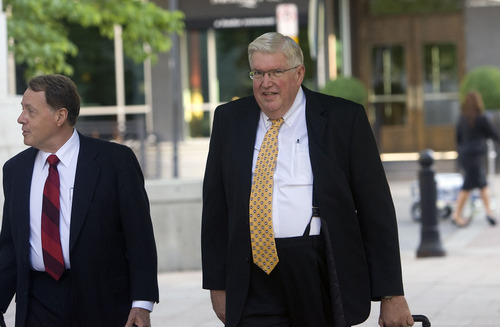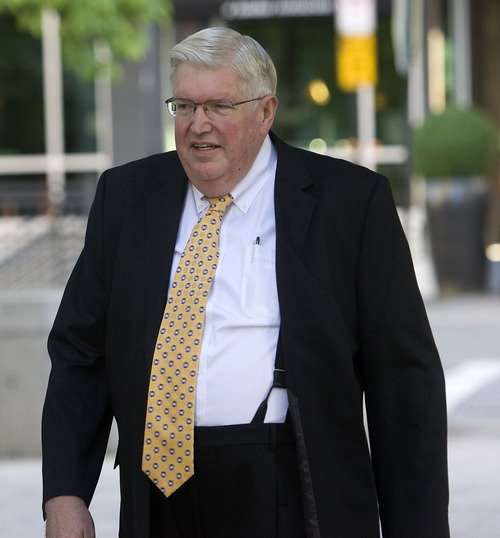This is an archived article that was published on sltrib.com in 2011, and information in the article may be outdated. It is provided only for personal research purposes and may not be reprinted.
Two contradictory portraits of a Brigham City orthopedic surgeon were presented to a jury Wednesday, as a four-week trial got underway in federal court.
Prosecutors said Dewey C. MacKay — who saw up to 120 patients a day and dispensed more hydrocodone than any other doctor in Utah — was little more than a drug dealer.
The defense said MacKay, 64, was a "caring and compassionate doctor," whose 30-year-career and spotless reputation are being tarnished by untrue allegations that he prescribed painkillers to patients without legitimate medical needs.
"He is being accused, irresponsibly and wrongfully, of acting like a drug dealer," said defense attorney Peter Stirba, during his opening statement. "The evidence will show that Dr. MacKay wasn't acting as a drug trafficker, but in good faith as a physician acting in the best way he could.
But Assistant U.S. Attorney Richard Daynes called MacKay a reckless physician who repeatedly filled out prescriptions for patients, even when their relatives called begging him to stop because their loved ones were either addicted or selling the medicine on the street for a profit.
MacKay's lack of supervision over his patients treatment caused the death of 55-year-old David Leslie Wirick, of Ogden, in 2006, Daynes alleged.
Daynes said MacKay continued to provide the man with drugs despite knowing he'd been diagnosed with Munchausen syndrome, a psychological disorder in which patients sometimes harm themselves to gain attention.
Wirick, a rocket scientist at Alliant Techsystems, died of a drug overdose during a three-day binge after filling prescriptions from MacKay.
"The treatment [patients] received was little to none," Daynes said. "Dr. MacKay would prescribe, prescribe, prescribe."
Mackay was indicted last August with 129 counts related to prescribing more than 1.9 million hydrocodone pills and nearly 1.6 million oxycodone pills between June 1, 2005, and October 30, 2009. But on the evening before the start of jury selection, prosecutors filed a motion to dismiss one-third of MacKay's charges, saying the case could be tried more effectively without the additional charges.
The Drug Enforcement Administration revoked his authorization to prescribe controlled substances after completing the investigation that led to his indictment.
Stirba argues his now-retired client denies wrongdoing and that he was within his rights to prescribe the drugs while operating a "chronic pain practice."
He told jurors he plans to call an expert who will testify that there is no recognized standard for how to treat people in chronic pain and that MacKay wasn't violating any regulations. He said MacKay would never behave unscrupulously with his patients because he ran into them at the grocery store and other places around the relatively small community of Brigham City.
"They didn't just show up, get a prescription, leave and that was the last time Dr. MacKay saw them," Stirba said. "He saw them dozens and dozens of times. He got to know them."
Stirba said many of MacKay's former patients who are now witnesses against him went to see other doctors who gave them the same diagnoses as MacKay did and also prescribed pain medications in the same manner as MacKay.
But Daynes argued there was a darker side to MacKay, saying the doctor spiraled into writing prescriptions at an illegal level after a heart attack and bypass surgery prevented him from continuing as a surgeon in 2007. Prosecutors will focus on 12 patients treated by MacKay, several who are under the age of 30 — a factor that raises questions about why so many young people would need high dosages of pain medication, Daynes said.
He cited the case of Allan Starr, who went to MacKay as an 18-year-old after suffering a football injury. MacKay took no medical history when Starr visited his office, and immediately gave the teenager a prescription for methadone. Starr returned for several more visits, with MacKay spending only minutes in the room before renewing prescriptions, Daynes said.
In another case, Kade Brown, a 27-year-old snowboarder, came to MacKay with complaints about back pain. Brown became addicted to painkillers and reported once falling asleep at the dinner table because he was "so doped up," Daynes said. The man's mother, Teresa Brown, called MacKay to tell the doctor to stop prescribing pain medication because her son needed help for addiction, Daynes said.
But two days after that phone call, MacKay allegedly handed out another prescription when Brown came to the office, telling Brown the drugs were "none of your mother's business," Daynes said. MacKay not only refilled Brown's prescription, but increased the dosages, Daynes said. Kade Brown later went through rehab for his dependence on painkillers, he said.
And then there's the case of Wirick, who received methadone prescriptions from MacKay after four back surgeries had failed to alleviate his pain. At one point, Stephen Bruce, a physician treating Wirick for his Munchausen syndrome, had called and asked MacKay to stop dispensing drugs to his patient. Wirick had been harming himself, including an instance where he injected fecal matter into his body, and Bruce worried that Wirick's next step would be to take too many drugs to get noticed, Daynes said.
"Five months later, Wirick walks into MacKay's office, even though MacKay told Dr. Bruce he wouldn't see Wirick," Daynes said. "For three days, Wirick binged on opiate narcotics."
He was found dead in his bed, Daynes said.
Stirba offered a different take on Wirick's death. He said the pain medication that MacKay prescribed enabled Wirick to go to work each day, despite a diagnosis of degenerative disc disease and chronic low-back pain. Multiple surgeries hadn't helped Wirick, and so the man sought MacKay out for chronic-pain management, Stirba said.
Stirba said all of MacKay's patients were being treated for orthopedic problems and since MacKay knew painkillers can be abused, he demanded his patients return for frequent visits so they could be monitored.
The trial continues Thursday before U.S. District Judge Dee Benson.
Twitter: @mrogers_trib







